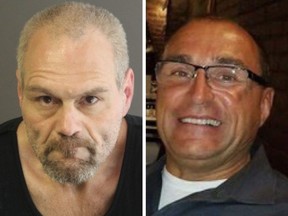When Joseph Hodgkin pushed the barrel containing Grant Norton’s body to the bank of the Thames River, he would have known he was disposing of the remains of a friend.

When Joseph Hodgkin pushed the barrel containing Grant Norton’s body to the bank of the Thames River, he would have known he was disposing of the remains of a friend.
Advertisement 2
That detail and many others concerning the bizarre and grisly death of the 59-year-old Ingersoll man three years ago – plus more insight into Hodgkin’s troubled, drug-addicted background – came to light in court Friday when Hodgkin, 53, was sentenced to four and a half years for being an accessory after the fact.
Norton, who had ties to a Hamilton crime family, was reported missing by his family on July 6, 2020. On July 19, 2020, London police officers found the large, white 190-litre barrel with the top open in the summer sun on the river bank.
It was, the judge said, “knowing, cruel and disrespectful treatment of another human being that Mr. Hodgkin once, apparently, considered to be his friend.”
“He may not have known that . . . in advance, but he knew full well that his so-called friend was in the barrel like a piece of garbage,” Superior Court Justice Kelly Tranquilli said in her sentencing decision. “He was prepared to get involved to dispose of the body in a manner intended to assist the killer or killers to evade detection.”
Advertisement 3
The sentence, which, with pre-sentence custody factored in, leaves Hodgkin with 16 months left to serve, became the latest entry on Hodgkin’s gigantic criminal record spanning 38 years and replete with property crimes, violent acts and breaches of court orders.
He’s an addict and crystal methamphetamine was his main addiction before he was arrested, having been a daily user for 15 years before Norton’s death.

In her review of the facts of the case, Tranquilli relied on a statement of agreed facts filed with the court at Hodgkin’s guilty plea in May. There were some starting details.
The body had been hogtied and trussed. It was identified through dental records. The cause of death was blunt force trauma to the head and stab wounds to the chest.
Advertisement 4
It took more than a year before London police secured the last of five arrests in the case. However, Hodgkin had popped up on their radar early on. The police were able to access Norton’s Google account, which had saved location data from his cellphone of his last known movements.
They had surveillance video of Hodgkin leaving a Dundas Street apartment building and grabbing a cab at about 1:30 am on July 7, 2020. He was dropped off at an Adelaide Street address, the home of the mother of one of his children.
More surveillance video from nearby Ada Street showed Hodgkin just before 4 am pushing a lawnmower with a large white barrel on it and a second unidentified man following behind. Minutes later, Hodgkin and the man were seen walking back with the mower, but no barrel.
Advertisement 5
The same cab driver took Hodgkin and the woman back to the Dundas Street apartment shortly before 5 am
Hodgkin was on a house arrest-like court release order on unrelated charges. He was arrested for breaching that order and in a police interview admitted he had pushed the lawn mower to get rid of the body for his female friend.
He wasn’t charged until a year later and after others had been arrested. Three remain before the courts and last week, Zaida Collin, 26, pleaded guilty to robbery and was sentenced to the equivalent of three years, 11 days short of time served.

Hodgkin told the police that woman at the apartment was alone when he arrived and Norton’s body was on the couch. It’s unclear how the body got into the barrel – Hodgkin denies he put it there – but “there’s no question the body was in the barrel when he took it to the river,” the judge said.
Advertisement 6
Tranquilli noted Hodgkin said at a July hearing that disposing of the body was “the dumbest thing I’ve done in my life.”
“That understatement fails to recognize the consequences of this incomprehensible decision,” she said. “It was a callous and horrific act which has devastated Mr. Norton’s family and shocked the conscience of our community.”
Hodgkin is the father of seven children ranging in ages from one to 31. His pre-sentence report indicates he has some Indigenous roots but minimal knowledge of the culture until this recent period in custody.
His childhood was difficult and he was removed from his home at 12 because of violence and substance abuse in his family. He never finished high school and worked as a brick layer, mover, carpet cleaner and general labourer.
Advertisement 7
His three years in custody at the Elgin-Middlesex Detention Center have allowed him to sober up and get treatment and counseling both for addiction and his mental health challenges.
Hodgkin sought additional time deductions on the sentence, arguing the overcrowding and lockdown conditions at the jail and COVID woes had exacerbated his anxiety and led to weight gain.
Assistant Crown attorney Meredith Gardiner was allowed to cross-examine Hodgkin on affidavits filed by defense lawyer Jim Zegers. Hodgkin agreed he had been a heavy crystal meth user and the illegal drug causes lack of sleep, psychosis, paranoia, loss of appetite and weight loss.
-

Guilty plea sheds light on death of man found in barrel along Thames River
-

A body, a barrel and a guilty plea in death of man found by Thames River
Even though he had been diagnosed with bipolar disorder and depression while in custody a dozen years ago, Hodgkin didn’t have a doctor in the community, and had chosen to self-medicate with crystal meth rather than take mental health medication.
Advertisement 8
He has been prescribed drugs in custody, all of which cause weight gain. “It takes away the voices, it takes away the paranoia, takes away the jittery feeling that you feel when you’re coming off drugs,” he said of the medications.
He had COVID-19 while locked up. But he no longer has Hepatitis C thanks to treatment at the jail, which he suffered from for 20 years.
But Hodgkin complained about a lack of physical exercise opportunities, such as “yoga, floor hockey or dodge ball” or a gym to work out and he’s spent countless hours locked up and sitting around.
Tranquilli commended Hodgkin for his efforts but warned it could be “his last chance in life for meaningful rehabilitation and a good life as a contributing member to his family and to society.”
Added the judge: “I wish you well and I trust you will continue to work hard and take this opportunity to turn your life around before it’s too late for you and your children.”

Comments
Postmedia is committed to maintaining a lively but civil forum for discussion and encourages all readers to share their views on our articles. Comments may take up to an hour for moderation before appearing on the site. We ask you to keep your comments relevant and respectful. We have enabled email notifications—you will now receive an email if you receive a reply to your comment, there is an update to a comment thread you follow or if a user you follow comments. Visit our Community Guidelines for more information and details on how to adjust your email settings.
Join the Conversation